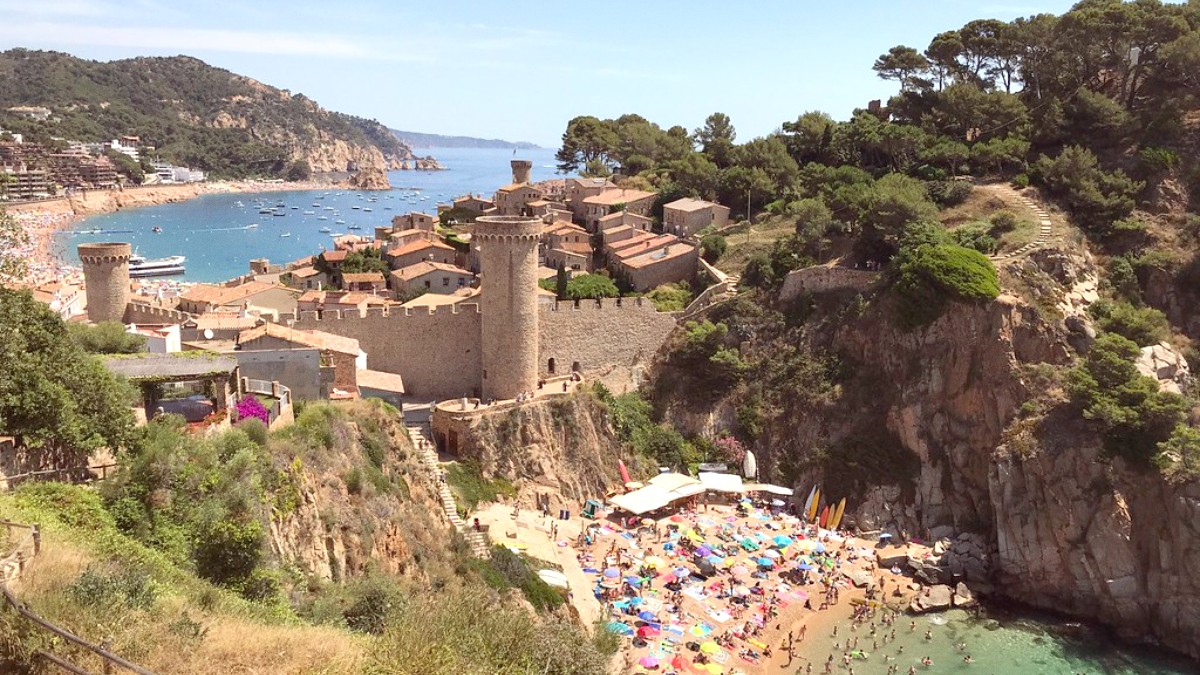
Spain
Spring (April-May): Temperatures stay mild, ranging from 15-22°C (59-72°F). Rainfall keeps moderate, and humidity levels stay low. This period presents pleasant weather for sightseeing, walking, and exploring the natural surroundings. Days are long enough for activities, and evenings turn cool, suggesting a Light jacket.
Summer (June-August): This is the warmest period, with temperatures typically between 25-30°C (77-86°F), often rising higher during heatwaves. Rainfall stays low, leading to consistently sunny days. Humidity remains moderate, and coastal breezes often ease the heat. This season suits beach activities, swimming, and lively atmospheres. Nights stay warm, inviting strolls and outdoor dining.
Choosing the shoulder season (April-May, September-October) often yields the best value and experience for Tossa de Mar, balancing agreeable weather with manageable crowds and reasonable prices.
For beach and swimming, July-August offers the warmest sea temperatures. Hiking and cycling suit April-May and September-October. Sightseeing and exploration prove comfortable during April-May and September-October with fewer people. Summer months host numerous local festivals.
Spain is a member of the Schengen Area, which simplifies travel for many nationalities.
Many nationalities, Schengen Area
Entry for tourism or business purposes without a visa. Stay up to 90 days within any 180-day period across the entire Schengen Area.
Beginning mid-2025, visa-exempt non-EU citizens need an ETIAS authorization for Schengen Area travel.
European Travel Information and Authorisation System
An online application. Fee €7. Authorization typically valid for three years or until passport expiry. A pre-travel screening measure.
Mandatory for visa-exempt non-EU citizens for security beginning mid-2025.
For citizens requiring a visa
Apply at the Spanish embassy or consulate in your country of residence prior to travel. Process can take several weeks.
Requires a completed application form, passport, photos, proof of accommodation, travel itinerary, and proof of financial means.
Visa-exempt citizens from numerous countries enter Spain for tourism or business without a visa for up to 90 days. From mid-2025, an ETIAS authorization will be a pre-travel screening measure for visa-exempt non-EU citizens. Citizens from countries not part of the visa-exempt agreements must apply for a Schengen visa at their Spanish embassy or consulate before travel.
Spain does not have general entry fees for tourists. Upon arrival at a Spanish airport or land border, standard immigration procedures apply. Present your passport to a border control officer, who may ask about your visit's purpose, length of stay, and accommodation details. The process usually proceeds quickly for travelers with valid documentation. Generally, no special permits are needed for tourism activities in Tossa de Mar.
Passport valid for at least three months beyond your intended Schengen Area departure. Issued within the last 10 years.
Airlines or border control may request proof of onward or return travel.
Demonstrate adequate financial means for your stay (bank statements, credit cards).
Mandatory for Schengen visa applicants (€30,000 minimum coverage). World Nomads, SafetyWing, Insubuy all offer policies.
Confirmation of hotel bookings or an invitation letter from a host.
Costs fluctuate depending on your travel style and preferences.
A budget of €40-€70 daily typically includes accommodation in a hostel dorm or a very basic guesthouse. Meals involve self-catering from supermarkets or inexpensive eateries.
A budget of €80-€150 daily provides for comfortable stays in 3-star hotels or mid-range guesthouses. Meals can be enjoyed at casual restaurants, including the popular "Menu del Día."
The official currency of Spain is the Euro (€). ATMs (cajeros automáticos) are widely available. Major credit and debit cards, Visa and Mastercard, are accepted at most hotels, restaurants, and shops. American Express sees less widespread acceptance. Inform your bank of your travel plans beforehand. Consider a Travel money belt for security.
Prior consultation with a healthcare professional remains a good practice.
Confirm all routine vaccinations are current (MMR, DTP, Varicella, Polio, annual flu shot).
Hepatitis A and Hepatitis B often receive recommendation for travelers to Spain. Consult a healthcare professional 4-6 weeks pre-trip.
Traveler's Diarrhea (drink Bottled water, practice hand hygiene, use Hand sanitizer), Sunburn/Heatstroke (use high-SPF Sunscreen, wear Wide-brimmed hats and Sunglasses), Jellyfish (check local flags).
Emergency Number: 112 (Police, Fire, Ambulance)
The closest major hospital is Hospital de Blanes. Tossa de Mar has a local health center (CAP) for non-emergency needs. Pharmacies (Farmacia) are widely available. EU citizens use EHIC. Non-EU citizens strongly consider comprehensive Travel insurance.
Tossa de Mar remains a very safe destination, with low crime rates. Petty crime like pickpocketing can occur in crowded spots in larger cities. Exercise standard precautions. No specific "no-go" neighborhoods exist in Tossa de Mar.
Natural hazards like heatwaves or rare flash floods can occur; stay informed of weather forecasts. Forest fire risk exists in dry periods in surrounding forested areas.
A policy should cover medical emergencies, evacuation, trip cancellation/interruption, personal liability, and theft/loss of belongings.
If adventure sports are planned, verify your policy extends coverage to these specific activities.
Keep the travel insurance emergency line readily accessible. Consider AirHelp for flight disruption compensation assistance.
Save all emergency numbers and important contacts (including your accommodation and travel insurance provider) in your phone. Also, have them written down in a physical format.